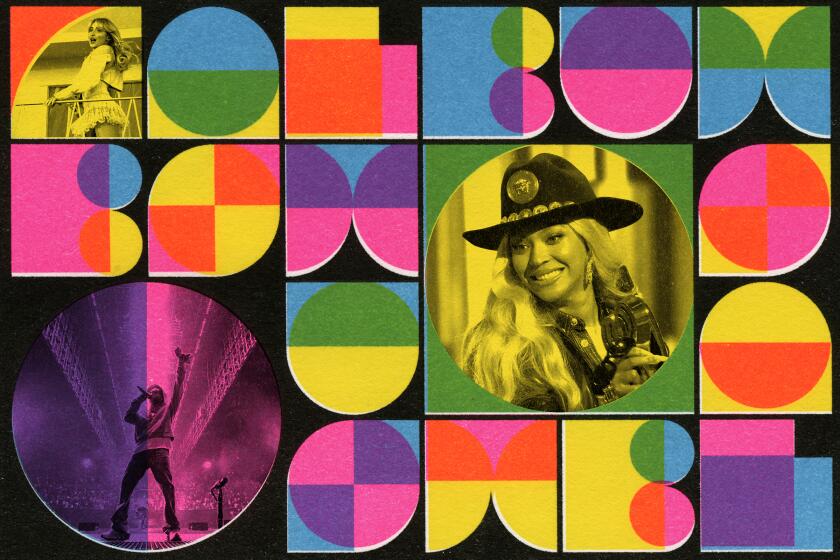First-Rate Sounds With a European Flair
LAURENT DE WILDE
“Spoon-a-Rhythm”
Columbia
* * * 1/2
ALDO ROMANO
“Canzoni”
Enja
* * *
ENRICO RAVA
“Italian Ballads”
MusicMasters
* * *
Any of the names above sound familiar? It won’t be surprising if the answer is “no.”
Yet “Spoon-a-Rhythm” is French pianist De Wilde’s second album for Columbia (his first, “The Back Burner,” was issued only in France, in 1995). Nor can the Italian players Rava and Romano be considered obscure artists. Rava has been a highly regarded trumpeter since the ‘60s, working with everyone from Gato Barbieri and Steve Lacy to Gil Evans and Cecil Taylor. And Romano, a drummer, has worked with Jean-Luc Ponty, Carla Bley and Philip Catherine and recorded with Steve Lacy and Joachim Kuhn.
Not bad credentials for any of these musicians--so why the low profiles? Undoubtedly for the simple reason that they are Europeans who are heard rarely, if ever, by American audiences.
Despite their relative lack of visibility, however, the quality of their music underscores the increasingly creative work being done by players from Europe and other parts of the world. Lacking a major, influential American voice--a John Coltrane or a Miles Davis--to affect their styles and musical attitudes, European players like De Wilde, Rava and Romano have been aggressively seeking their own voices.
The quest for an imaginative approach to improvisation that De Wilde reveals in this exceptional album is centered on his choice of an unusual accompaniment sound from bassist Ira Coleman, drummer Dio Parsons and percussionist Bobby Thomas. Each of these talented musicians supplies De Wilde with precisely the right foundation.
Each track--even familiar, sometimes overdone items like “Relaxin’ at Camarillo,” “ ‘Round Midnight” and “Invitation”--emerges as a unique jazz tone poem. De Wilde’s technique, more than enough to allow him the freedom to whip into Oscar Peterson-like flights of fancy, is instead consistently used at the service of his musical ideas.
“Edward K.,” for example, a tribute to Duke Ellington, simmers with rhythmic momentum and dramatic coloration, with De Wilde mostly accenting turbulent, low note runs. “ ‘Round Midnight” and the original “Tune for T” reveal the remarkable depth and breadth of De Wilde’s understanding of Thelonious Monk.
Interestingly, De Wilde is also an accomplished writer, with his book “Monk”--which won the Charles Delaunay award in France for Jazz Book of the Year in 1996--to be published in the U.S. this year.
The Italian jazz albums both take similar approaches to repertoire with programs based on Italian pop songs, movie themes, traditional melodies and arias. It’s not the stuff one ordinarily imagines as source material for jazz improvisation. But the opening notes of “Canzoni,” in which trumpeter Paolo Fresu lays down a lush rendering of “T’ho voluto bene” (better known in this country as “Non dimenticar”) make it immediately apparent that jazz can deal with a wide array of subject matter.
Romano’s arrangements feature Fresu, who clearly owes a debt to Miles Davis, in a series of gorgeously melodic settings. But the creative star is pianist Franco d’Andrea, whose solos are a consistent blend of rapid-fire virtuosity and sunny, Mediterranean lyricism.
Some of the tunes are familiar--”Torna a Surriento,” “O Sole Mio,” “Anema e core” (yes, the one sung by Connie Francis in the ‘50s)--but every track is a welcome example of the creative and emotional potential that still resides in mainstream jazz for those artists willing to reach beyond the confines of traditional repertoire.
Rava’s “Italian Ballads” is an edgier, more rhythmic collection. Like “Canzoni,” it has benefited from its chance-taking, immediately apparent in the initial track, which is based on “The Song of Gelsomina” from Fellini’s classic “La Strada.” And Rava doesn’t stop there. Other unusual choices include the Puccini arias “Un bel di, vedremo” and “O mio babbino caro.”
Rava has structured the music into an unusual instrumental sound via an ensemble of two guitars, accordion, bass and drums, with occasional vocals from Barbara Casini. There are times when the textures approach avant-garde qualities, other times when a soaring Italian lyricism takes over. Everything, again, is eminently listenable, charged by Rava’s superb trumpet playing and the fascinating paths taken by his curious musical mind.
*
Albums are rated on a scale of one star (poor) to four stars (excellent).
More to Read
The biggest entertainment stories
Get our big stories about Hollywood, film, television, music, arts, culture and more right in your inbox as soon as they publish.
You may occasionally receive promotional content from the Los Angeles Times.










